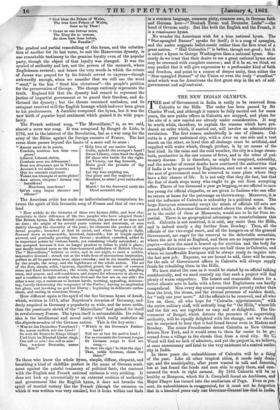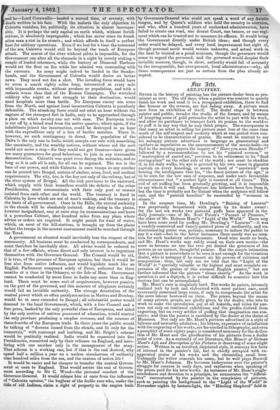THE NEW INDIAN OLYMPUS.
rEseat of Government in India is really to be removed from Calcutta to the Hills. The order has been passed by Sir Charles Wood, and although it cannot be fully carried out for some years, the new public offices in Calcutta are stopped, and plans for the site of a new capital are already under consideration. It may be worth while, therefore, to explain the reasons which have pro- duced an order which, if carried out, will involve an administrative revolution. The first reason undoubtedly is one of climate. Cal- cutta is a great undrained city, with a river on one side and a vast marsh on the other, so level that all drainage must be artificial,-and supplied with water which, though profuse, is by no means of the best kind. In the rains and the cold weather, the city is a huge steam- bath, productive in the one season of fever, and in the other of pul- monary disease. It is therefore, as might be imagined, unhealthy, and the number of recent deaths have convinced the authorities that if India is to be governed by Englishmen, sent out at a mature age, the seat of government must be removed to some place where they have a fair chance of life. It is not only that they die fast, but that the fear of death stops many who ought to go out from accepting office. Places of ten thousand a year go begging, or are offered to men too young for official etiquette, or are given to Indians who can offer no return at home for the patronage so thrown away. Moreover, it is said the influence of Calcutta is unhealthy in a political sense. The large European community sways the minds of officials till acts are passed which a Governor-General seated above the clouds at Simla, or in the midst of them at Mussoorie, would see to be far from im- partial. There is no geographical advantage to counterbalance this evil. Calcutta is not centrical, it is said, any more than the 'gins, and is indeed nearly a day further from Bombay. Then, all the officials of the vice-regal court, and all the hangers-on of the general Government, are eager for the removal to the delectable mountain, where the air is cold as England, and there are no impertinent news- papers—where the mind is braced up for exertion and the body for moonlight flirtations—where expenses are half those in Calcutta, and where no insufferable European will be always ready to inquire into the last new job. Expense, we are bound to add, there will be none, for the sale of Government offices in Calcutta will always supply funds for rebuilding them in the Hills.
We have stated the case as it would be stated by an official talking confidentially, and we need scarcely say that such a project will find plenty of warm supporters. The honest and reasonable desire for a better climate acts in India with a force that Englishmen can hardly comprehend. Men every day accept comparative poverty rather than bear the heat, the steam, and the eternal presence of sudden death, for "only one year more." All the officials to be removed, and all who live on them, all who hope for "Calcutta ajipointments," with the entire military staff, will ardently long for " the Hills," where life and the fair sex are together so easy and so delightful. The Go- vernment of Bengal, which detests the presence of a supervising authority, will be equally delighted with the change, and we should not be surprised to hear that it had found favour even in Madras and Bombay. The minor Presidencies detest Calcutta as New Orleans detests New York, and it would seem to them far easier to be go-, verned from a village in the clouds than from a rival city. Sir Cr Wood will find no lack of admirers, and yet the project is, we believe; at once unnecessary and fatal to the very existence of a central authol, rity in India.
In three years the unhealthiness of Calcutta will be a thing of the past. Like all other tropical cities, it needs only drain- age, and the municipality, after years wasted in talk and funerals, has at last found the funds and men able to apply them, and com- menced the work in right earnest. By 1861 Calcutta will be as healthy as Rangoon, which Sir A. Campbell found an Aceldama, and Major Phayre has turned into the sanitarium of Pegu. Even at pre- sent, its unhealthiness is exaggerated, for it must not be forgotten that in a hundred years only one Governor-Geueral has died in India,
rJanuary 4, 1862.]
and he—Lord Cornwallis—landed a second time, at seventy, with death written in his face. With the malaria the only objection to Calcutta vanishes, for, politically, its situation is almost incompar- able. It is perhaps the only capital ou earth which, without fortifi- cations, is absolutely impregnable ; which has never since its found- ation seen a riot in its streets ; and which affords in itself a perfect base for military operations. Even if we lost for a time the command of the sea, Calcutta would still be beyond the reach of European attack. The ascent of the river without pilots is impossible, for the Government can alter all the channels in a night by merely sinking a couple of loaded schooners, while the battery at Diamond Harbour would set the fleet on fire while her admiral was contending with the currents. An army might indeed be landed in the Sunder- bands, and the Government of Calcutta would desire no better news. They need not fire a shot. The invading force would have to cross a marsh eighty miles long, intersected at every mile with impassable creeks, without produce or population, and with a malaria worse than that of the Roman Campagna. The wretched soldiery who might at last struggle to their destination, would need hospitals more than battle. No European enemy can come from the North, and against local insurrection Calcutta is peculiarly defensible. The attacking force could not exist an hour without the capture of the strongest fort in India, only to be approached through a plain on which cavalry can act with ease. The European town is cut off by a broad road from the native quarter, which again, if the inhabitants joined the insurrection, could be destroyed in an hour with the expenditure only of a box of lucifer matches. There is, however, no such contingency to dread. The population of the Delta is the only one in India which accepts our rule with something like unanimity, and the wealthy natives, without whose aid the mob could not move a step—for they could not get firearms—have given too many guarantees for good behaviour, to join in any treasonable demonstration. Calcutta was quiet even during the mutinies, and so long as it is safe all is safe, for all can be regained. The sea is the base of our power, and while Calcutta is ours troops in any number can be poured into Bengal, certain of shelter, arms, food, and medical requirements. The city, too, is the key not only of the railway, but of the river system of Bengal. All the rich provinces to the eastward, which supply with their boundless wealth the deficits of the other Presidencies, must communicate with their only port or remain isolated from each other and the world. The treasury is fixed in Calcutta by laws which are not of man's making, and the treasury is the basis of all government.. Once in the Hills, the central authority in the clouds will be absolutely isolated. Any rising in the plains, however insignificant, may at once stop its communications and leave it a powerless Cabinet, nine hundred miles from any place where advice or orders are required. It might perish for want of water, which, on most of the hill-stations, is brought np from the plains before the troops in the nearest cantonment could be marched through the Terai.
A government so situated would inevitably lose the respect of the community. All business must be conducted by correspondence, and must therefore be inevitably slow. All advice would be reduced to that of a. few officials, whose direct and only interest is to ingratiate themselves with the Governor-General. The Council would be rid, it is true, of the pressure of European opinion, but then it would be free also from native influence, and would legislate much like an English Parliament composed solely of Peers, collected for three months at a time in the Orkneys, or the Isle of Man. Government cannot be conducted by mere force in India any more than in Eng- land. There must be some sort of acquiescence, however passive, on the part of the governed, and this measure of allegiance certainly would fail an invisible authority. The strange detestation of the central power which so often paralyzes action in Madras and Bombay, would be at once extended to Bengal ; all substantial power would descend to the local Government, which, with a free Council and a free press, backed by the only powerful class of Europeans, and aided by the only section of natives possessed of education, would control the only province producing a surplus revenue, and the sources of three-fourths of the European trade. In three years the public would be talking of "decrees issued from the clouds, and fit only for the immortals," with contempt and loathing, and Mr. Bright's scheme would be pratically realized. India would be separated into five Presidencies, connected only by their reliance on England, and inter- fering with one another only in the management of the army. That scheme is a working one, but if that is the end desired, why spend half a million a year on a useless simulacrum of authority nine hundred miles from the sea, and the centres of active life ?
It would be easier and far cheaper to transfer the central Govern- ment at once to England. That would secure the end of Govern- ment according to Sir C. Wood—the personal comfort of the Governor-General. It would release him at once from the influence of " Calcutta opinion," the bugbear of the feeble race who, under the title of old. Indians, claim a right of property in the empire built
by Governors-General who could not speak a word of any Asiatic tongue, and by Queen's soldiers who held the country in aversion, and who, after a hundred years of unchecked administration, have failed to create one road, one decent Court, one tenure, or one regi- ment which can be trusted not to massacre its officers. It would bring the Government directly under British ideas; and though every order would be delayed, and every local improvement lost sight of, though personal merit would remain unknown, and actual work in the heat be treated as a penal sentence, though the governors would cease to regard the governed, and the governed would despise their invisible masters, though, in short, authority would fall of necessity to the irresponsible, but ever-present, local administrators—why, all those consequences are just as certain from the plan already ac- cepted.



































 Previous page
Previous page